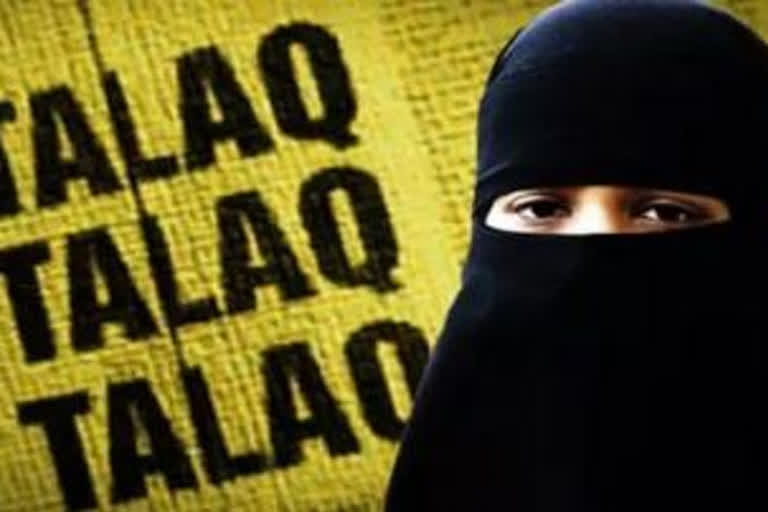New Delhi: Parliament on Tuesday approved the bill that makes instant Triple Talaq a criminal offence, after the contentious legislation was passed by Rajya Sabha following non-aligned BJD extending support and NDA constituents JD(U) and AIADMK walking out.
Following is the chronology of events:
- October 16, 2015: SC bench asked Chief Justice of India to set up an appropriate bench to examine if Muslim women face gender discrimination in divorce cases while dealing with a case of Hindu succession.
- February 5, 2016: SC asked then-attorney general Mukul Rohatgi to assist it on the pleas challenging the constitutional validity of 'Triple Talaq', 'Nikah Halala' and polygamy.
- March 28, 2016: SC asked the Centre to file a report of a high-level panel on 'Women and the law: An assessment of family laws with focus on laws relating to marriage, divorce, custody, inheritence and succession'.
- SC impleaded various organisations, including All India Muslim Personal Law Board (AIMPLB), as parties in the suo motu matter.
- June 29, 2016: SC said 'triple talaq' among Muslims will be tested on "touchstone of the constitutional framework".
- October 7, 2016: For the first time in India's constitutional history, Centre opposed in the SC these practises and favoured a relook on grounds like gender equality and secularism.
- February 14, 2017: The SC allowed various interlocutory pleas to be tagged along with the main matter.
- February 16, 2017: The SC said a five-judge bench would be set up to hear the challenge to 'triple talaq', 'nikah halala' and polygamy.
- March 27, 2017: The AIMPLB told the SC pleas were not maintainable as the issues fall outside judiciary's realm.
- March 30, 2017: The SC said these issues were "very important" and involve "sentiments" and said a constitution bench would start hearing it from May 11.
- May 11, 2017: The SC said it would examine whether the practise of triple talaq among Muslims was fundamental to their religion.
- May 12, 2017: The SC said the practise of triple talaq was the "worst" and "not desirable" form of dissolution of marriages among Muslims.
- May 15, 2017: The Centre told the SC that it will bring a new law to regulate marriage and divorce among the Muslim community if triple talaq struck down. The SC said it would examine whether triple talaq was an essential part of religion under Article 25 of the Constitution.
- May 16, 2017: The AIMPLB told the SC that matters of faith cannot be tested on grounds of constitutional morality, said triple talaq a matter of faith for last 1,400 years. Equates the issue of triple talaq with the belief that Lord Rama was born in Ayodhya.
- May 17, 2017: The SC asked the AIMPLB whether a woman can be given an option of saying 'no' to triple talaq at the time of execution of 'nikahnama'. The Centre told the SC that triple talaq was neither integral to Islam nor a "majority versus minority" issue but rather an "intra-community tussle" between Muslim men and deprived women.
- May 18, 2017: The SC reserved its verdict on triple talaq.
- May 22, 2017: The AIMPLB filed an affidavit in the SC saying it would issue an advisory to 'Qazis' to tell bridegrooms that they will not resort to triple talaq to annul their marriage. The AIMPLB listed out in the SC guidelines for married couples. These include "social boycott" of those Muslims who resort to triple talaq and the appointment of an arbitrator to settle marital disputes.
- August 22, 2017: The SC by a majority verdict of 3:2 ruled that divorce through triple talaq is void, illegal and unconstitutional and against basic tenets of Quran. Three judges favoured putting on hold for six months the practise, asking the government to come out with a law in this regard.
- December 17, 2018: The Bill was introduced in Lok Sabha by the Minister of Law and Justice, Mr. Ravi Shankar Prasad on December 17, 2018.
- December 31, 2018: Opposition stalls the bill in Rajya Sabha, days after it was passed in the Upper House. The Opposition demanded that the bill be scrutinised by the selected panel.
- June 20, 2019: President Ram Nath Kovind addresses a joint session of Parliament, calls upon all parties to unite in getting legislation making Triple Talaq a punishable offence cleared. President says practices like Triple Talaq and Nikah Halala must go in the interest of equal rights to women.
- June 20, 2019: Government tables The Muslim Women (Protection of Rights on Marriage) Bill, 2019 in Rajya Sabha.
- June 21, 2019: Government tables The Muslim Women (Protection of Rights on Marriage) Bill, 2019 in Lok Sabha. It replaces the ordinance promulgated in February.
- July 25, 2019: Lok Sabha clears triple talaq bill. The bill makes 'Talaq-e-Biddat' or instant triple talaq a cognizable offense. In the Lok Sabha, 303 parliamentarians voted in favour whereas, 82 MPs voted against the bill.
- July 30, 2019: Triple talaq bill passed in Rajya Sabha



